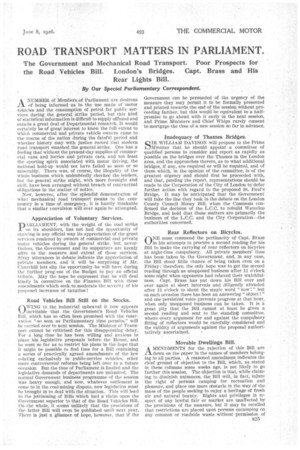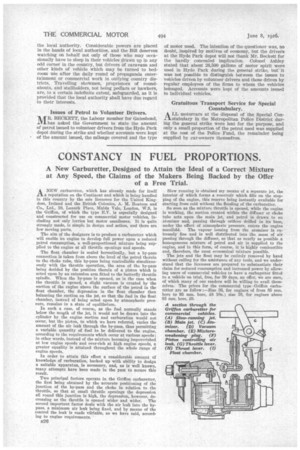ROAD TRANSPORT MATTERS IN PARLIAMENT.
Page 9

Page 10

If you've noticed an error in this article please click here to report it so we can fix it.
The Government and Mechanical Road Transport. Poor Prospects for the Road Vehicles Bill. London's Bridges. Capt. Brass and His Rear Lights Bill.
By Our Special Parliamentary Correspondent.
ANUMBER of Menffiers„of Parliament are desirous of being informed as to the use made of motor vehicles and the consumption of petrol for public services during the general strike period, but this kind of statistical information is difficult to supply offhand and entails a great deal of Departmental research. It would certainly be of great interest to know the full extent to which commercial and private vehicle owners came to the rescue of the nation during the fateful period and whether history may with justice record that modern road transport smashed the general strike. One has a feeling that without the present-day supplies of commercial vans and lorries and private cars, and not least the sporting spirit associated with motor driving, the national hold-up would not have failed so soon or so miserably: There was, of course, the illegality of the whole business which undoubtedly checked the leaders, but the general strike might, with more foresight and skill, have been arranged without breach of contractual obligations in the 'matter of notice.
Now, however, after the splendid demonstration of what mechanical road transport means to the community in a time of emergency, it is hardly thinkable that a similar convulsion will ever again be attempted.
Appreciation of Voluntary Services.
P.NRLIAMENT, with the weight of the coal strike on its shoulders, has not had the opportunity of showing in any official way its appreciation of the great services Tendered by owners of commercial and private motor vehicles during the general strike, but, nevertheless, the Government and its supporters are keenly alive to the measure and extent of those services. Stray utterances in debate indicate the appreciation of private members, and it will be surprising if Mr. Churchill lets slip the opportunity he will have during the further prog;-ess of the Budget to pay an official tribute. May the hope be expressed that lie will deal kindly in committee on the Finance Bill with those amendments which seek to moderate the severity of his proposed increases of taxation !
Road Vehicles Bill Still on the Stocks.
ek WING to the industrial upheaval it now appears V./inevitable that the Government's Road Vehicles Bill, which has so often been promised with the reservation "so soon as Parliamentary time permits," will be carried over to next session. The Minister of Transport cannot be criticised for this disappointing delay. For a long time he has been willing and anxious to place his legislative proposals before the House, and lie went so far as to restrict his plans in the hope that it might be possible to find time for a Bill containing a series of practically agreed amendments of the law relating exclusively to public-service vehicles, other more controversial reforms being left over to a future occasion. But the time of Parliament is limited and the legislative demands of departments are unlimited. The normal Government business programme of the session was heavy enough, and now, whatever settlement is come to In the coal-mining dispute, new legislation must he brought in to deal with the situation. This will lead to the jettisoning of Bills which had a claim upon the Government superior to that of the Road Vehicles Bill. On the whole, it seems unlikely that the provisions of the latter Bill will even be published until next year. There is just a glimmer of hope, however, that if the
Government can be persuaded of the urgency of the measure they may permit it to be formally presented and printed towards the end of the session without proceeding farther, but this would be equivalent to a halfpromise to go ahead with it early in the next session, and Prime Ministers• and Chief Whips rarely consent to mortgage the time of a new session so far in advance.
Inadequacy of Thames Bridges.
SIR WILLIAM DAVISON will propose to the Prime Minister that he should appoint a committee of qualified persons to consider and report as rapidly as possible on the bridges over the Thames in the London area, and the approaches thereto, as to what additional bridges, if any, are required or will be required, and of these which, in the opinion of the committee, is of the greatest urgency and should first be proceeded with, and that, pending the report, representations should be made to the 'Corporation of the City of London to defer further action with regard to the proposed St. Paul's Bridge. It may be anticipated that the Government will take the line they took in the debate on the London County Council Money B1U, when the Commons confirmed the decision of the L.C.C. to rebuild Waterloo Bridge, and hold that these matters are primarily the business of the L.C.C. and the City Corporation--the authorities concerned.
Rear Reflectors on Bicycles.
ONE must commend the pertinacity of Capt. Brass in his attempts to procure a second reading for his Bill to make the carrying of rear reflectors on bicycles at night-time compulsory. All private members' time has been taken by the Government, and, in any case, the Bill stood little chance of being taken even on a Friday ; therefore, the only hope was to, get the second reading through as unopposed business after 11 o'clock some night when opponents had relaxed their watchfulness. Capt. Brass has put down his Bill over and over again at short intervals and diligently attended after 11 o'clock to shout the magic word " now! " but on each occasion there has been an answering " object I " arid one persistent voice prevents progress at that hour, when only unopposed business can be taken. It is a great pity that the Bill cannot at least be given a second reading and sent to the standing committee, where every argument for and against the compulsory fitting of reflectors would be carefully considered and the validity of arguments against the proposal authoritatively ascertained.
Movable Dwellings Bill.
A MENDMFNTS for the rejection of this Bill are ,L1,-down on the paper in the names of members belonging to all parties. A reasoned amendment indicates the chief ground of objection to the Bill, which, as stated in these columns some weeks ago, is not likely to go further this session. The objection is that, while claiming to diminish nuisances, the Bill will, in fact, injure the right of persons camping for recreation and pleasure, and place one more obstacle in the way of the mass of the people seeking to enjoy a heritage of fresh air and natural beauty. Rights and privileges in respect of any lawful fair or market are unaffected by the provisions of the measure, but it may be recalled that restrictions are placed upon persons encamping on any common or roadside waste without permission of
the local authority. Considerable powers are placed in the hands of local authorities, and the Bill deserves watching on behalf not only of those who may occasionally have to sleep in their vehicles drawn up in any odd corner in the country, but drivers of caravans and other kinds of vehicle which may be turned to bedroom u.:Se after the daily round of propaganda entertainment or commercial work in outlying country districts. Travelling showmen, proprietors of roundabouts, and stallholders, not being pedlars or hawkers, are, to a certain indefinite extent, safeguarded, as It is provided that the local authority shall have due regard to their interests.
Issues of Petrol to Volunteer Drivers.
TR. BECKETT, the Labour member for Gateshead, .1.1`_Lhas asked the Government to state the amount of petrol issued to volunteer drivers from the Hyde Park depot during the strike and whether accounts were kept of the amount issued, the mileage covered and the type of motor used. The intention of the questioner was, no doubt, inspired by motives of economy, but the drivers at the Hyde Park depot will not thank Mr. Beckett for the hardly concealed implication. Colonel Ashley stated that about 26,500 gallons of motor spirit were used in Hyde Park during the general strike, but—it was not possible to distinguish between the issues to vehicles driven by volunteer drivers and those driven by regular employees of the firms to whom the vehicles belonged. Accounts were kept of the amounts issued to individual vehicles.
Gratuitous Transport Service for Special Constabulary.
ALL motorcars at the disposal of the Special Constabulary in the Metropolitan Police District during the general strike were lent for the purpose, and only a small proportion of the petrol used was supplied at the cost of the Police Fund, the remainder being supplied by car-owners themselves.




























